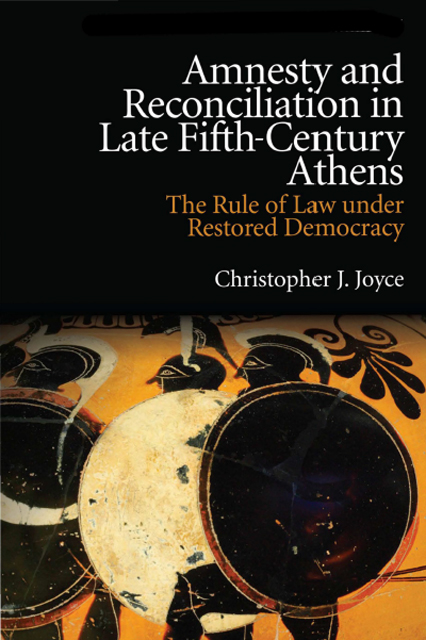Book contents
- Frontmatter
- Contents
- Preface and Acknowledgements
- List of Abbreviations
- 1 Introduction: The Athenian Reconciliation in Modern Scholarship
- 2 Civil Strife at Athens, 404–403
- 3 Oaths and Covenants
- 4 The Legal Scrutiny and the Resurrection of the Rule of Law
- 5 The Amnesty Applied (I): The Trials of Agoratus and Eratosthenes
- 6 The Amnesty Applied (II): The Trials of Callimachus and Socrates
- 7 The Athenian Reconciliation as the Paradigm for the Greek World in the Classical and Hellenistic Ages
- 8 The Rule of Law Restored: The Legacy of the Reconciliation in the Fourth Century
- Bibliography
- Index Locorum
- Subject Index
4 - The Legal Scrutiny and the Resurrection of the Rule of Law
Published online by Cambridge University Press: 03 June 2023
- Frontmatter
- Contents
- Preface and Acknowledgements
- List of Abbreviations
- 1 Introduction: The Athenian Reconciliation in Modern Scholarship
- 2 Civil Strife at Athens, 404–403
- 3 Oaths and Covenants
- 4 The Legal Scrutiny and the Resurrection of the Rule of Law
- 5 The Amnesty Applied (I): The Trials of Agoratus and Eratosthenes
- 6 The Amnesty Applied (II): The Trials of Callimachus and Socrates
- 7 The Athenian Reconciliation as the Paradigm for the Greek World in the Classical and Hellenistic Ages
- 8 The Rule of Law Restored: The Legacy of the Reconciliation in the Fourth Century
- Bibliography
- Index Locorum
- Subject Index
Summary
Once the Covenants of Reconciliation had been contracted and sworn into effect, it remained for the legislators of 403 to rebuild democracy. Modern scholarship has often distinguished the democracy of the fourth century from its fifth-century prototype on the basis that whereas the one was built on the principle of the rule of law, the other prioritised popular sovereignty. The decision of the legislators in 403 to publish a comprehensive list of valid laws, as distinct from decrees, is rightly understood to dovetail with a concept of democracy which anchored itself in the sovereignty of law, and in the process of that legal redaction, clarification was given that no decree of the popular assembly should have higher authority than a law (And. 1.87). In a famous summary of how the Athenian democracy evolved, the Ath. Pol. states (ch. 41) that the democracy of the fourth century was the last and final phase of the evolution of democracy at Athens. Apart from the rule of law, however, this paltry narrative provides little indication of the differences between the final democracy and the penultimate phase, which prevailed from the mid-fifth century down until the subjection of Athens by Sparta in 404 and the installation of the regime of the Thirty. The democratic restoration did not pronounce a wholesale return to the status quo ante. In its most important outline, democracy from 403 was very similar to what had preceded it, but it contained one very crucial innovation, the process of law-making and, implied in this, a redefinition of what a ‘law’ was. The fashion of much scholarship to date has been to see fourth-century democracy as a more ‘conservative’ version of the fifth-century model, but this chapter will argue that that approach is mistaken from its foundations. The aim of the republication of laws in 403 was to assert the primacy of legal principle in the new constitution, yet that assertion went hand in hand with a fervently democratic objective: to guarantee that Athens did not backslide into civil war, it was paramount that democracy should be protected by legal principle. Democracy and rule of law were bedfellows.
Due recognition of the truth of this statement has been obstructed by the belief that, in Greek theoretical circles, democracy and rule of law were somehow antithetical.
- Type
- Chapter
- Information
- Amnesty and Reconciliation in Late Fifth-Century AthensThe Rule of Law under Restored Democracy, pp. 90 - 125Publisher: Edinburgh University PressPrint publication year: 2022



